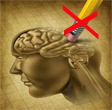Tuesday, 1 September 2015
Memory Loss in Alzheimer’s Reduced for the First Time

On November 4, 1906, German neurologist Alois Alzheimer first described the “particular malady of the cerebral cortex” of his patient Auguste D. Over a century later, this “particular malady” that now bears his name still resists every medication developed so far to treat it: none has yet succeeded in halting the progress of Alzheimer’s disease, or even in slowing it down. At best, some medications reduce some of the disease’s symptoms. In the past decade alone, an estimated $1 billion has been swallowed up by clinical trials of new Alzheimer’s medications, with almost nothing to show for them.
But after decades of disappointment, the tide may be turning at last. A preliminary study published in September 2014 by Dr. Dale Bredesen, in the journal Aging, suggests that the memory losses associated with Alzheimer’s can be reversed through an elaborate 36-point treatment program including dietary changes, exercise, intellectual stimulation and other activities that had already been recognized as Alzheimer’s prevention factors separately. But in this case, it is the unusual step of combining them that seems to have curative value. (more…)
Tuesday, 24 December 2013
Junk Food and Alzheimer’s: Closer Links Than Once Believed
 For most parents, packing their kids’ school lunches in the morning may seem like just a routine task, but it turns out to be a really important one. Not only can it influence children’s future eating habits, but it may also have a major impact on their quality of life when they are old enough to be grandparents themselves.
For most parents, packing their kids’ school lunches in the morning may seem like just a routine task, but it turns out to be a really important one. Not only can it influence children’s future eating habits, but it may also have a major impact on their quality of life when they are old enough to be grandparents themselves.
Or at least that’s what many recent studies on Alzheimerb s-type dementia seem to suggest. What’s the connection? Children may be more likely to develop obesity and diabetes—established risk factors for Alzheimer’s—if their parents fill their lunch bags with junk food because it’s easier than arguing with them about the virtues of eating a balanced diet! (more…)
Monday, 25 March 2013
Donating Your Brain to Science
 People who donate their brains to be used in neuroscientific research after they die are making a great contribution to our understanding of normal aging and of aging-related disorders such as Alzheimer’s disease. Normally, such donations are made anonymously, but for the sake of an exhibition designed to draw attention to this humanitarian gesture, 12 brain donors aged 84 to 100 gave the organizers permission to disclose their identities. (more…)
People who donate their brains to be used in neuroscientific research after they die are making a great contribution to our understanding of normal aging and of aging-related disorders such as Alzheimer’s disease. Normally, such donations are made anonymously, but for the sake of an exhibition designed to draw attention to this humanitarian gesture, 12 brain donors aged 84 to 100 gave the organizers permission to disclose their identities. (more…)
Mental Disorders | Comments Closed
Monday, 23 July 2012
Alzheimer’s Type Dementia
 Two months ago, some new content to The Brain from Top to Bottom has been added: a sub-topic entitled “Alzheimer’s Type Dementia” under the main topic “Mental Disorders”. This form of dementia, more commonly referred to as Alzheimer’s disease, receives a lot of attention in the media, but its causes remain uncertain. (more…)
Two months ago, some new content to The Brain from Top to Bottom has been added: a sub-topic entitled “Alzheimer’s Type Dementia” under the main topic “Mental Disorders”. This form of dementia, more commonly referred to as Alzheimer’s disease, receives a lot of attention in the media, but its causes remain uncertain. (more…)
Mental Disorders | No comments







